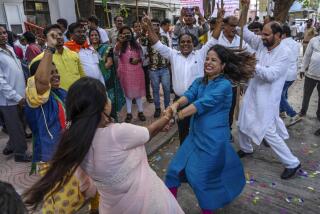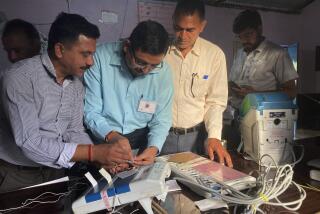Religious Extremism Loses in India Vote : Elections: Militant Hindus’ slippage in state balloting eases fears of a fundamentalist tide. Returns also show weakening of ruling party.
- Share via
NEW DELHI — The militant Hindu party that once seemed fated to capture control of the world’s largest democracy faltered badly in key state elections, returns showed Monday, indicating that most Indians have no stomach for religious extremism.
In fact, in India’s most populous state, Uttar Pradesh, the biggest winner could turn out to be a coalition linking millions of untouchables and other poor and lower-caste Hindus with Muslims. The elections are taking place in several northern states and New Delhi, the capital.
The Bharatiya Janata Party, which wants to enact Hindu fundamentalist rule, did capture control of a new city assembly in the teeming capital. But its campaign dream of “today five states, tomorrow the entire country” came nowhere near being realized.
“The BJP has lost the referendum,” was the unequivocal verdict of political writer Surenda Pratap Singh in the Calcutta daily the Telegraph.
The elections, in which a third of the country’s voters could cast ballots, also highlighted the weakened position of the Congress-I Party. That once-mighty political machine had steered India to independence and served the dynasty of Jawaharlal Nehru; his daughter, Indira Gandhi, and her son Rajiv.
Now headed by Prime Minister P.V. Narasimha Rao and under fierce fire for corruption and lackluster leadership, the Congress Party won decisively only in Himachal Pradesh, wresting the isolated northwestern state from BJP hands.
Last December, Rao dissolved BJP-controlled governments in four states in the “Hindi-speaking belt” of north India after the BJP championed the razing of a mosque at Ayodhya, in Uttar Pradesh, to make way for a Hindu temple.
The demolition of the 16th-Century mosque sparked three weeks of rioting in which up to 2,000 people died nationwide. It was the worst bloodshed between Hindus and Muslims since the creation of the separate country of Pakistan and Indian independence from Britain in 1947.
The BJP militants went into the campaign calling the balloting a “mini-general election,” with leader Lal Krishna Advani accusing the Rao government of possessing no more backbone than a “banana.”
The BJP, whose name means Indian People’s Party, insists that the country’s more than 700 million Hindus should legally dominate India’s 120 million Muslims and other minorities, and it opposes all “alien” influences--from minarets to Coca-Cola.
The state elections, the first in India since the Hindu-Muslim riots, were expected to demonstrate whether the BJP could convert into votes the intense emotions aroused by the Ayodhya events. But political analyst Amulya Ganguli said the militant party, which rocketed from obscurity to become the country’s main political opposition in less than a decade, was fated to fail. Its message, Ganguli said, contradicts “the essence of the very faith that it was claiming to uphold--tolerance and deep faith in the unity of all religions that has evolved over centuries.”
“India has returned to its secular tradition,” agreed Law Minister H.R. Bhardwaj.
Watered by the Ganges, a river sacred to Hindus, Uttar Pradesh mirrors the political mind of India as a whole. So the elections in that state of 120 million were closely watched nationwide.
In the battle for Uttar Pradesh’s 425-seat legislature, the BJP had 143 seats as tallying continued Monday night. The coalition of the Socialist Party and the Party of Depressed Classes had won at least 134 seats, with exit polls showing Muslims voting overwhelmingly for it as the force most likely to frustrate the ambitions of the BJP by costing the extremist party its majority.
In the arid state of Rajasthan, the BJP won back 94 seats in the 200-member assembly, falling short of the absolute majority needed to rule but picking up the support of at least four independents in its quest to form a new government.
Counting in the state of Madhya Pradesh was to begin today, and in the small eastern state of Mizoram, whose government was not dissolved by Rao but is being replaced in a previously scheduled election, voters go to the polls today.
More to Read
Sign up for Essential California
The most important California stories and recommendations in your inbox every morning.
You may occasionally receive promotional content from the Los Angeles Times.










